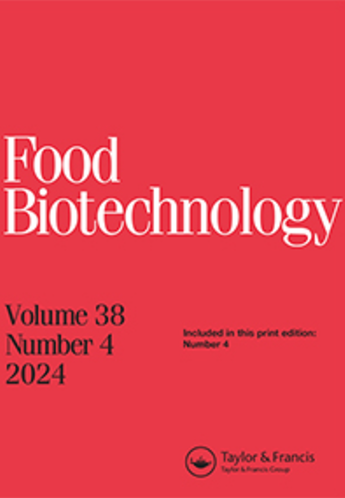Chemo-Enzymatically Modified Cereal Brans as a Modulator of Healthy Gut Bacteria: An In-Vitro and In-Vivo Study
IF 1.6
4区 农林科学
Q4 BIOTECHNOLOGY & APPLIED MICROBIOLOGY
引用次数: 0
Abstract
ABSTRACT Finger millet, kodo millet, and rice bran were chemo-enzymatically modified, and their prebiotic potential was evaluated using in-vitro human fecal batch fermentation and in-vivo feeding to mice. Modified cereal bran (mCB) from finger millet, kodo millet, and rice bran contained 30%, 17%, and 24% higher content of dietary fiber compared to their respective native bran. Tannin, flavonoids, polyphenols, and phytate content were reduced in the mCBs. Fecal batch fermentation with mCBs enhanced the short-chain fatty acid levels and the abundance of selected gut bacteria such as Bifidobacteria, Lactobacillus, and Bacteroidetes along with propionate and butyrate. In-vivo experiments showed no change in weight gain, blood glucose, and serum lipids. mCB supplementation enhanced the abundance of selected bacteria such as Bifidobacteria, Lactobacillus, and Bacteroidetes and decreased the abundance of E. coli, Klebsiella, and Clostridium. These findings provide an insight into the functional food potential of valorized mCBs in maintaining a healthy gut environment. GRAPHICAL ABSTRACT化学酶改性谷糠作为健康肠道细菌调节剂的体内外研究
摘要对手指小米、小米和米糠进行了化学酶改性,并通过体外人类粪便分批发酵和小鼠体内喂养评估了它们的益生元潜力。由手指小米、小米和米糠制成的改性谷糠(mCB)的膳食纤维含量分别比其原生谷糠高30%、17%和24%。在mCBs中,单宁、类黄酮、多酚和植酸酶含量降低。mCBs的粪便分批发酵提高了短链脂肪酸水平和选定肠道细菌的丰度,如双歧杆菌、乳酸杆菌和拟杆菌,以及丙酸盐和丁酸盐。体内实验显示,体重增加、血糖和血脂没有变化。补充mCB提高了所选细菌的丰度,如双歧杆菌、乳酸杆菌和拟杆菌,并降低了大肠杆菌、克雷伯菌和梭菌的丰度。这些发现深入了解了价值化mCBs在维持健康肠道环境方面的功能性食物潜力。图形摘要
本文章由计算机程序翻译,如有差异,请以英文原文为准。
求助全文
约1分钟内获得全文
求助全文
来源期刊

Food Biotechnology
工程技术-生物工程与应用微生物
CiteScore
3.80
自引率
0.00%
发文量
15
审稿时长
>12 weeks
期刊介绍:
Food Biotechnology is an international, peer-reviewed journal that is focused on current and emerging developments and applications of modern genetics, enzymatic, metabolic and systems-based biochemical processes in food and food-related biological systems. The goal is to help produce and improve foods, food ingredients, and functional foods at the processing stage and beyond agricultural production.
Other areas of strong interest are microbial and fermentation-based metabolic processing to improve foods, food microbiomes for health, metabolic basis for food ingredients with health benefits, molecular and metabolic approaches to functional foods, and biochemical processes for food waste remediation. In addition, articles addressing the topics of modern molecular, metabolic and biochemical approaches to improving food safety and quality are also published.
Researchers in agriculture, food science and nutrition, including food and biotechnology consultants around the world will benefit from the research published in Food Biotechnology. The published research and reviews can be utilized to further educational and research programs and may also be applied to food quality and value added processing challenges, which are continuously evolving and expanding based upon the peer reviewed research conducted and published in the journal.
 求助内容:
求助内容: 应助结果提醒方式:
应助结果提醒方式:


